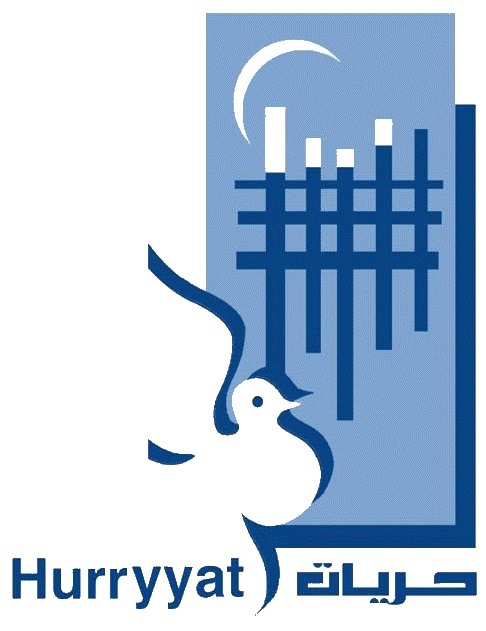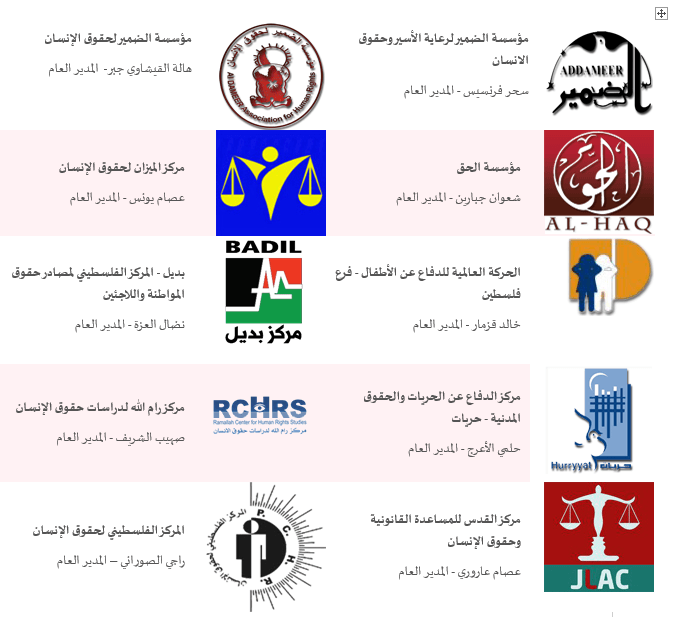Palestinian prisoners at the prisons of the Occupation called off their open hunger strike, which had lasted for eight days, as they made victory by getting their basic rights, after a series of systematic violations that they are subjected to. The violations had aimed to place the Palestinian prisoners under more constraints in detention especially after the publication of the recommendations of the committee that was formed by the Occupation’s Minister of Internal Security.
On the anniversary of the Palestinian Prisoner’s Day, statistics of ADDAMEER Prisoner Support and Human Rights Association tell us that at the end of March 2019, the number of Palestinian male and female prisoners at the prisons of the Occupation was 5,450 including 497 administrative detainees, 49 female prisoners, 7 members of the parliament – Palestinian Legislative Council –, 205 children prisoners (including 32 less than 16 years of age). According to DCI-P the Occupation forces have arrested 10,000 Palestinian children since 2000. They were tried before military courts that lacked the basis of fair trial rights. Detained Palestinian children are subject to torture and inhumane treatment while at custody or during interrogations. This violates all international norms and conventions related to children. Children prisoners are locked up at separate sections at Ofer Prison, Majeddo Prison, and Damon Prison. A number of children prisoners have recently been transferred to Damon Prison, which lack basichuman living conditions.
Many male and female prisoners at the Occupation prisons suffer from medical negligence, which exacerbates their health conditions. According to Hurryyat – Center for Defense of Liberties and Civil Rights the number of sick prisoners at occupation prisons is more than 750, including 350 with chronic diseases, 7 have cancer, 8 have tumors, 23 have eye diseases, 30 have heart diseases, 24 have hypertension and diabetes, 5 have cardiovascular diseases, 11 with disability, 37 have osteopathy, 12 have kidney diseases, 28 have internal medicinal diseases, 23 have psychological and mental diseases, 18 have breathing difficulties, and 61 have bullet wounds.
Recommendations of Occupation’s Internal Security Minister Committee “Erdan’s Committee”
The Occupation’s Internal Security Minister, Gilad Erdan, formed a special committee in June 2018 which includes Knesset members and the intelligence agency. The purpose of the committee was to assess the conditions of detention of Palestinian prisoners at Occupation prisons and identify means of reducing such conditions to the minimum stage. The committee reviewed the conditions of Palestinian prisoners and paid visits to prisons. Then the committee recommended to impose more restrictions on prisoners at Occupation prisons. Hence, the Occupation authorities started systematic attacks on prisoners, which were justified by the recommendations of the committee.
Female Palestinian Prisoners were the First to be hit by the Punitive Measures
Cameras were switched back on at Hasharon Prison – the cameras were switched off for many years following an agreement between female prisoners and the prison administration in 2011. Naturally, Palestinian female prisoners refused the switching of the cameras back on and refused to go on their recreational time for two months. This was part of the punitive measures that followed the Committee’s recommendations – Erdan’s Committee actually visited Hasharon Prison where Palestinian female prisoners are detained.
Female prisoners also sent a letter in which they wrote that all recreational areas are covered by cameras; hence, they would not go to such areas and switching the cameras back on restricted the prisoners’ privacy. On September 20, 2018, the Occupation’s intelligence proposed switching off cameras for two and a half hours so that female prisoners can have their recreational time. Prisoners refused since the time was insufficient. Consequently, the prisoners were threatened to be transferred to Damon Prison because they refused the Occupation intelligence offer of switching cameras off for two and a half hours. The offer of switching the cameras off for two and a half hours was withdrawn. Prisoners’ protests against operating the cameras went on for two months. As a result, they were all transferred to Damon Prison, which lacks the minimumhumanlife conditions. That happened in the first week of November 2018.
Special Units Raid Prisons and Oppress Prisoners
The prisons administration launched provocative and sudden inspection campaigns at several prisons. This was part of the decision to impose more restrictions on prisoners. This was applying by mainly breaking into prisons by special units especially at Ofer Prison, Naqab Prison, and Rimon Prison. This included attacks on prisoners at Ofer and beating them with sticks, legs, and arms. Military dogs were also used in the raids against prisons, as well as rubber bullets, teargas, and stun grenades. Prison cells were damaged in many sections and prisoners’ belongings were ransacked. This was followed by tension at Naqab Prison and Rimon Prison ensued by the installation of cell jammer devices that affected some sections at Naqab and Rimon prisons and prisoners’ use of cellular phones, radio, and television. This deprived prisoners of the only means available to communicate with the world outside prison. The oppression led to injuring several prisoners and some ended up hospitalized. Until this moment, Palestinian prisoners still suffer from their wounds since they did not get the necessary treatment and suffer intentional medical negligence from the occupation authority. The recent breaking into prisons also led to taking several punitive measures against prisoners such as transfer from one prison to another, solitary confinement of some prisoners, banning prisoners from meeting their lawyers, ban on family visits, and imposing big fines on them.
Battle of Karameh 2: Prisoners’ Legitimate Step against Restriction
Prisoners went on open hunger strike, so that their legitimate demands could be met. The strike was launched after negotiations about living conditions in prisons between prisoners’ representatives and prison administration failed. This occurred especially when more restrictions were imposed on prisoners. Prisoners wanted to return to the situation that preceded the implementation of Erdan Committee’s recommendations. Prisoners also submitted several demands to end their hunger strike, including:
- Cancelation of Erdan Committee’s recommendationsincluding imposing more restrictions on prisoners especially with respect to food, cantina, prison recreational time, books, and education. Prisoners said that food rations were reduced after Erdan Committee’s recommendations were implemented as well as restrictions on education and availability of books. Many educational books were confiscated from a number of prisons and all textbooks were later banned. This meant that prisoners’ families could not bring books to their detained sons and daughters.
- Removal of all cell jamming devices that the prison administration had installed at Rimon and Naqab prisons.
- Install public phones at prisons’ sections to ensure prisoners’ natural right is guaranteed by international conventions and treaties to be able to communicate with their families and the outside world.
- Cancel the ban of visits to hundreds of prisoners and end collective punishments imposed by prison managements since 2014[1].
- End punitive measures recently imposed by Prison Authority especially those imposed in the aftermath of the campaigns of raids and oppression against prisoners at Naqab, Ofer, and Rimon prisons, and the return of prisoners to the sections they were transferred from.
- Ensure humanitarian conditions at the Mi’bar[2]and improve means of transportation of prisoners, especially sick prisoners.
- Transfer Palestinian female prisoners to a different prison where humanitarian conditions are available. There are 49 female prisoners and they are all imprisoned at Damon Prison, which lacks even the minimal life conditions. Damon Prison was previously a tobacco warehouse and a stable for horses. Hence, the structure of the prison was originally designed to be humid inside; it was never meant to accommodate human beings.
- Enhance prison conditions of children prisoners
- End medical negligence policy and ensure treatment for the sick prisoners and those who were wounded during recent attacks on prisoners.
- End solitary confinement policy: Prison administration places Palestinian prisoners in solitary confinement for security or psychological reasons or as punitive measures for disciplinary violations at prison. A prisoner is placed in a cell where the only possession allowed in is clothes. There is also a mattress and blanket. Solitary confinement can be based on a court order since the law allows the military courts to sentence prisoners to 6 months in solitary confinement. The courts may also sentence a prisoner to 12 months in a cell with another prisoner. The courts can extend the solitary confinement for additional periods and for indefinite periods.
Actually, to officers of the Israeli Prison Authority use solitary confinement policy against Palestinian prisoners; especially the leaders, as punitive measure to destabilize them and to deprive them of the right to communicate with the world outside prison and with their families. The officers of the Israeli Prison Authority also use solitary confinement against prisoners to subdue them and to weaken their capacity to organize, divide them, and incapacitate their ability to organize their fight for the rights that are guaranteed for the prisoners of war and freedom fighters in Third Geneva Convention and the Fourth Geneva Convention and other human rights conventions.
Administrative Detention: Detention without Charges or Trial
The arbitrary Occupation policy against Palestinian prisoners does not stop at detention conditions. It also affects administrative detainees who are placed in detention arbitrarily, which violates international conventions and treaties. The Occupation forces use administrative detention systematically and illegally. Palestinians are detained without charges or trial on the basis of a secret file or evidence that the prisoners or the prisoners’ lawyer have no access to. According to Israeli military orders, administrative detention can be renewed indefinitely; however, each administrative detention order is a maximum of six months that can be renewed. There are six Palestinian prisoners who are on an open hunger strike in protest against administrative detention policy. They demand an end to their administrative detention. They are Hasan Ewiwi, Husam al-Ruza (al-Ruza started a hunger strike on March 20, 2019) and currently detained at Eshel Prison. Khaled Faraj and Mohammad Tabanja are two administrative detainees who started an open hunger strike on March 26, 2019; they are in solitary confinement at Naqab Prison. Dahood Odwan started a hunger strike on March 1, 2019 and Oda al-H’roob has been on hunger strike since April 2, 2019.
Occupation authority bans the prisoners who are on hunger strike from any communication with the world outside prison and imposes restrictions on the visits of their lawyers. Hence, the Occupation authority pays no attention whatsoever to their basic right to meet and consult with a lawyer, which is guaranteed by international conventions and agreements.
The Fourth Geneva Convention and other international standards of fair trial procedures stress banning the use of administrative detention as an alternative to trial. This confirms that administrative detention, as used by the Occupation, is arbitrary detention and inconsistent with international laws and norms.
[1]Increasingrestrictions on Palestinian prisoners has occurred frequently including in 2014 when three Israeli settlers disappeared in the West Bank and during the recent war on Gaza. Many of the prisoners’ rights were restricted such as banning family visits to a number of prisoners or making such visits intermittent or irregular. Gaza prisoners face increasing restrictions on visits by their families making such visits bimonthly rather than monthly. The number of satellite channels prisoners could watch in prison was reduced to 3 out of 10. The prison yard walk time was reduced to two hours per day and shopping at the cantina limit was reduced from NIS 1,200 to a maximum of NIS 800.
[2]This is the prison where Palestinian prisoners are held while being transferred from one prison to another.




